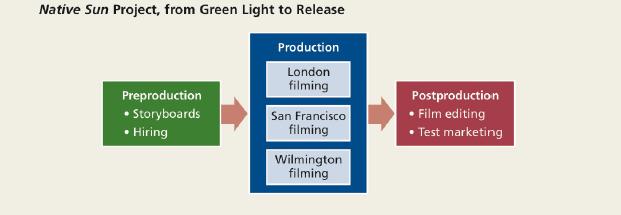Recall from Chapter 1 that Convex Productions produces full-length motion pictures for distribution worldwide. Convex has just
Question:
Recall from Chapter 1 that Convex Productions produces full-length motion pictures for distribution worldwide. Convex has just purchased the rights to a movie script entitled Native Sun, which it intends to develop as its next project. Native Sun is the story of an orphaned human raised by an alien race, visiting Earth on business and becoming entangled in intrigue here. Its simultaneous classification as science fic- tion/fantasy and action/adventure is expected to draw a broad audience, although the big-budget nature of Native Sun poses several risks. None- theless, Convex Productions is close to closing a deal with its longtime funding partner, Malomar Pictures, who will hopefully green light the film in a few days. Upon receiving the green light, Convex can begin spending Malomar's money on the Native Sun project. Convex Productions has agreed to purchase completion insurance for the project, guaranteeing the return of Malomar's investment if Native Sun suffers some catastrophic setback during filming, such as the death of a leading actor. However, Malomar remains concerned about Native Sun as an investment. The completion insurance policy protects against disruptions preventing the movie from being released, but does not guarantee its timely release into the marketplace. For the best yield on its substantial investment, Malomar wants assurance that Native Sun will be released in time for the summer block buster season, beginning in late May. If Native Sun were green-lighted in the next few days, Convex Productions then would have only 38 to 42 weeks to release the movie when Malomar feels it would maximize box office profits and only 46 weeks to benefit from any momentum in the summer movie season at all. To accomplish this, Convex must complete three phases of work between green light and movie release, as illustrated here:
Some aspects of the Native Sun project are easy to anticipate: preproduction should take 6 weeks from green light, and postproduction should require 16 weeks of work after filming, including several sneak previews in which the film is test marketed with small audiences and then reedited, based on their feedback. Actual movie production, however, is subject to some uncertainty. Native Sun will be filmed in three different locations, and Convex estimates that this work would normally take about 6 weeks at each location. However, unexpected events occur during filming and propagate quickly in this type of project, such as a permit to close streets expiring before filming there finishes, delayed because one actor was sick with the flu. As a result, Convex's production experts agree that when it rains, it pours in film production, and disruption of any amount in 6 weeks' worth of work generally means it will take about 10 weeks to complete all that work instead. Happily, filming in London is not likely to be disrupted, because filming there is done on constructed sets in the closed, controlled environment of Lamplight Studios. Here the only real risk to a 6-week completion time is the possibility of flu or similar, so Convex estimates only a 5% chance of disruption and delay there. However, filming in Wilming- ton, North Carolina, and San Francisco, California, are both done on location, meaning primarily outdoors, and thus both rely on favorable weather. Wilmington will provide rural backdrops, while San Francisco is needed for its iconic city landscape. Thus, filming in San Francisco is further complicated by the city permitting process, allowing Convex to briefly interfere with the flow of city traffic at key locations on certain dates. As a result, Convex estimates a 10% chance of disruption and delay in Wilmington, while double that probability for the work on location in San Francisco.
The original estimates of 6 or 10 weeks at each location reflect Convex Productions' preferred style of scheduling, in which its cast and crew work at one location until all work there is finished, and then move to the next location. Convex could protect itself against the possibility of disruption with an alternate schedule that holds each of the three locations open for 18 weeks, flying personnel between the three throughout that period. This allows filming to work around disruptions by shifting activity elsewhere, guaranteeing that all production work will be finished in about 18 weeks. This alternate schedule is not preferred by Convex because it often doubles the direct expense of film- ing, while cast and crew dislike it for being complicated and tiring. To hurry the comple- tion of Native Sun, Convex also has the option of skipping the test marketing/reediting phase of postproduction. In this option, Native Sun is edited once, based on the director's best estimate of what the audience most wants to see, and then sent straight to market without any sneak previews to check the director's assumptions. This cuts time required for postproduction in half, but increases the risk of Native Sun not being as popular and profitable as if improved by the test-marketing process. Malomar Pictures would be most upset by this shortcut, as its conversations with Convex Productions so far have been based on the commonsense assumption that a movie and investment this large would be finished through test marketing, to maximize the potential return on the investment. In addition to Malomar's desire for a summer release, Convex Productions has its own reasons to worry about prompt completion of the film. For every week that passes, Native Sun is exposed to the danger of being twinned by a rival production company, who rushes a similar story into production for release at the same time or earlier, pilfering Convex's marketing efforts. Even now there is a rumor that a notorious low-budget movie producer has hired a writer to develop a script with the working title Wayward Home. This industry rumor describes Wayward Home as "an action story about a guy raised by aliens who visits Earth for the first time." If this rumor is true, then Native Sun must arrive in theaters as early in the summer as possible, to claim the interested movie audi- ence and defeat the appearance of Wayward Home.
Questions
1. Describe each and all of the distinct risks discussed in the Native Sun project. What type of risk does each represent?
2. Assume that Native Sun receives the green light from Malomar Pictures. If Con- vex Productions uses its preferred type of production scheduling, and test markets Native Sun according to Malomar's expectations, what is the expected value of the time until Native Sun's release? What is the chance that Native Sun arrives in the market in time for the summer blockbuster season?
3. Using your work to question 2, describe the benefit of the alternative production schedule, in which Convex keeps all three locations open for 18 weeks.
4. Now state your recommendations to Convex Productions on how to proceed from the green light on Native Sun, assuming that signal occurs in the next few days. What risks are you choosing to minimize, and at what cost, if any? What risks do your recommendations tolerate or even create, if any?
Step by Step Answer:






